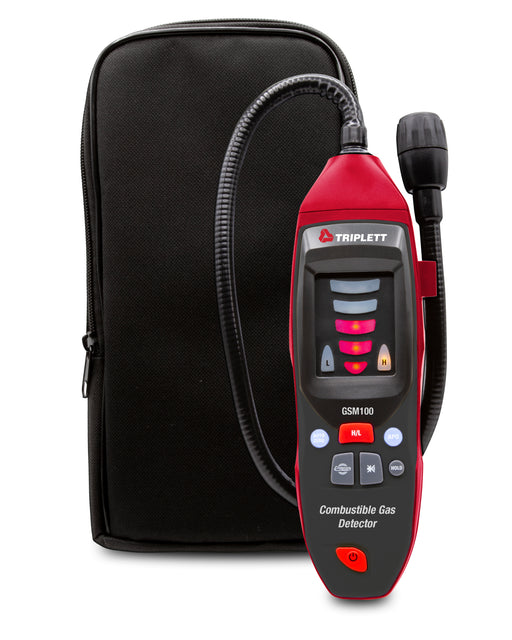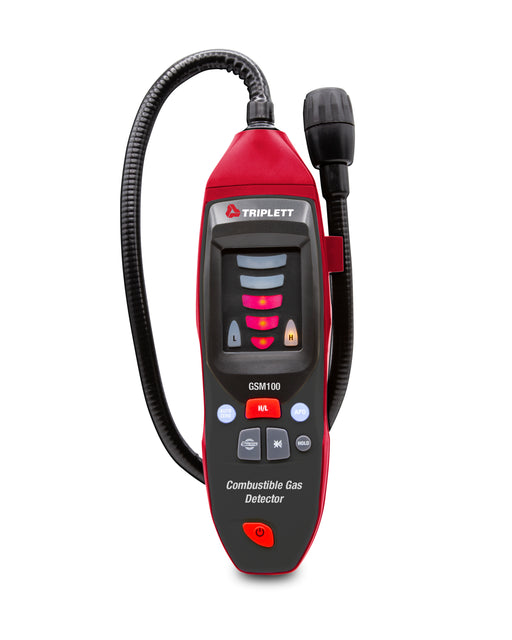Know More About Triplett Combustible Gas Detector and Pen
What is a Combustible Gas Detector?
Also called combustible gas leak detector pen, these natural gas leak detectors can identify various gases such as hydrogen, carbon monoxide, propane, methane ethylene, ethane, benzene, iso-butane, ethanol, acetaldehyde, formaldehyde, toluene, hexane p-xylene, ammonia, hydrogen sulfide, and more. These natural gas sniffer detectors also sense certain types of mixtures which may contain natural gases, such as paint thinners, dry cleaning solutions, industrial solvents, and so on. This device is calibrated according to fresh air and it measures the presence of gases based on this parameter. The device has a hold button to freeze the measurement and one can adjust low and high sensitivity settings. They come with a rechargeable battery and an AC charger as well as LED displays to issue alerts. Their ticking noise and vibration levels increase based on the gas level detected. We offer portable multi gas detectors that can accurately detect gases.
How Do You Detect a Natural Gas Leak?
While the gas detectors will do their job, it is important that employers or the concerned authorities remain vigilant about the dangers of gas leakage and ensure there are no such symptoms. Some typical symptoms are formation of air bubbles, smell of gas, hissing sounds, and so on. Use these detectors in case of any such signs and ensure you evacuate the area if gas leak is suspected.
How Do You Detect a Propane Gas Leak?
A gas such as propane can be detected through smell. You can use specific propane gas leak detectors although a multi gas detector will also detect propane. Propane has a garbage-like smell that lasts for some time after the leak. Using the right gas detector in such cases helps prevent damage to life and property.
Types of Combustible Gas Detectors
There are various types of fixed and portable combustible gas detectors used in residential, commercial, as well as industrial units. Some are designed for specific gases, while most of them can detect multiple gases. Broadly speaking, these detectors can be categorized into three types based on their way of functioning.
- Catalytic Bead Sensors: This is a very old technology that has been in use for over a century. These sensors detect gases using beads or pellet resistors.
- IR Sensors: These non-dispersive infrared sensors have been in use from many years and have evolved over the last four to five decades. However, they are relatively less useful in detecting hydrocarbons.
- MPS Sensors: These molecular property spectrometer sensors are mainly multi gas detectors that are technologically advanced and do not require recalibration. They are accurate with a reduced rate of false alarms. Triplett offers combustible gas detectors of this type.
How to Operate Combustible Gas Detector?
Here are some pointers on operating the combustible gas detectors we offer.
- These detectors comprise sensors, status indicators, lanyard, and on/off switch.
- First, ensure there is no static discharge as it could cause fire in case there is gas leakage in the area. You can do this by doing a small static charge test.
- Do this test away from the testing area and before leak detection. Touch the conductor with one hand and place the other hand on an earth grounded metal. If there is static discharge, the yellow light will switch on for some time. In this case, do not test for gas leak.
- After ensuring zero static discharge, remove the sensor cap to detect leakage.
- Switch on the on/off button and the green indicator light will be on.
- Trace the sensor in the area for possible gas leakage detection. The red light indicator will switch on in case of gas detection, else the green light will turn on.
- Aside from visual signals such as LED light indicators, there will be an audible tone too.
Working of Combustible Gas Detectors
Our combustible gas detectors detect concentrations of gases by using an internal sensor. This sensor is heated as it operates and interacts with the gases. The sensor communicates the presence of gases to the unit which issues alerts to the user using various indicators including red LED lights. There are five threshold levels of measurement within low and high settings of sensitivity. When the device receives the message from the sensor, it issues an alert to the user by blinking the appropriate light(s).
Precautions When Using Combustible Gas Detectors
Here are some precautionary measures a user must take when using these detectors.
- Avoid extremely damp or humid environments, especially for combustible gas leak detector pen. Also, do not expose this model to very high temperatures.
- Do not expose these devices in rain or wet environments.
- While the GSM100 model is suitable for industrial environments, do not operate it in a cluttered area. Also, the area must be well-lit.
- Ensure the equipment is not broken anywhere.
- Keep it out of reach of children.
- Do not use it in explosive or flammable environments as if gases are present, there may be fire.
- Avoid direct body contact with earthed or grounded equipment to avoid electric shocks.
- When using the detector, wear protective gear such as non-skid safety shoes, dust mask, hard hat, eye protecting glasses, and so on.
Applications of Combustible Gas Detectors
Here are some application areas of our gas detectors based on the model.
- Combustible Gas Detector with Flex Gooseneck - (GSM100): This device can detect several gases such as methane, hydrogen, carbon monoxide, propane, ethane, ethylene hexane, benzene, iso-butane, ethanol, toluene, acetaldehyde, formaldehyde, p-xylene, ammonia, hydrogen sulfide, and so on. Hence, it is typically meant for detecting gas leakage in industries such as oil & gas, paint manufacturers as well as storage units, industrial solvents and chemicals, and so on. It can also detect common mixtures that would include or emit more than one of these gases.
- Combustible Gas Leak Detector Pen - (GSM050): This handy combustible gas leak detector pen is typically meant for residential or other lighter applications and is not suited for continuous and heavy industrial use. It can detect can gas leaks from liquid gas containers such as soldering torches, camping cartridges, lighters, and so on.


